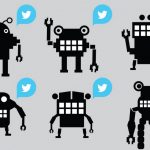 The role of Twitter bots and other means of automated disruption of political and scientific debate has been a hot topic for several years now, with society waging an ongoing battle against the owners of bots in an attempt to ensure information and debate is reliable.
The role of Twitter bots and other means of automated disruption of political and scientific debate has been a hot topic for several years now, with society waging an ongoing battle against the owners of bots in an attempt to ensure information and debate is reliable.
New research from the University of Southern California highlights the advances being made by bot developers, with the latest generation increasingly lifelike, and therefore harder to spot.
The researchers come to this conclusion after analyzing bot activity during the 2018 elections in the United States, and comparing this activity with that during the 2016 elections.
The analysis included over 250,000 social media users who were active during both elections. The researchers found over 30,000 bots among them, which gave them a strong sample to assess changes in behavior and approach.
Modified behavior
They found that during the 2016 election, bots typically focused on retweeting, with a high number of tweets on the same or similar messages. By 2018 however, things had progressed, and now bots would retweet less frequently, which is designed to replicate human users, who are also less likely to retweet now than in the past.
The bot agents were also more likely to act in gangs as well so as to replicate the king of multi-user conversations around an idea that are more common in human engagements. For instance, during the 2018 elections, it was more common for bots to establish their voice and engage in dialogue with people, with some even using polls to try and lend legitimacy to the accounts.
“Our study further corroborates this idea that there is an arms race between bots and detection algorithms. As social media companies put more efforts to mitigate abuse and stifle automated accounts, bots evolve to mimic human strategies. Advancements in AI enable bots producing more human-like content. We need to devote more efforts to understand how bots evolve and how more sophisticated ones can be detected. With the upcoming 2020 US elections, the integrity of social media discourse is of paramount importance to allow a democratic process free of external influences,” the authors say